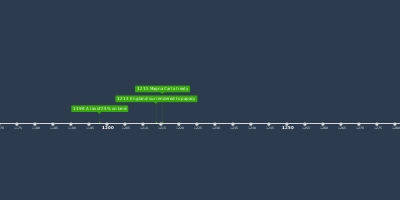jan 1, 1689 - Locke - Two Treatiese on Governement
Description:
“The great and chief end, therefore, of men's uniting into commonwealths, and putting themselves under government, is the preservation of their... life liberty and estate.”In his Second Treatise on Government, Locke asked by what right an individual can claim to own one part of the world, when, according to the Bible, God gave the world to all humanity in common. He answered that although persons belong to God they own the fruits of their labor.[1] When a person works, that labor enters into the object. Thus, the object becomes the property of that person.
Said justice was the basis for a natural right to private property, not labour mixing.
"By nature fairness is all inclusive and applicable to everyone equally, otherwise it becomes its opposite. The moral authority that fairness gives to private property is what allows the institution to exist independently of law and government. To loose sight of that universal morality must lead to property having another man made basis, one that logically could be destroyed by man."
"No man could ever have a just power of over the life of another, by right of property in land or possessions, since it would be always a sin in any state to let his brother perish for wants of affording him relief out of his plenty. God, the lord and father of all has given no one of his children such a property in his peculiar portion of the things of this world, that he has given his needy brother a right to the surplus of his goods."
Added to timeline:
Date:
jan 1, 1689
Now
~ 336 years ago
